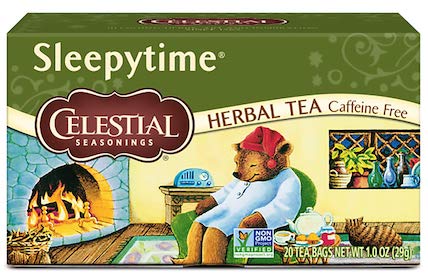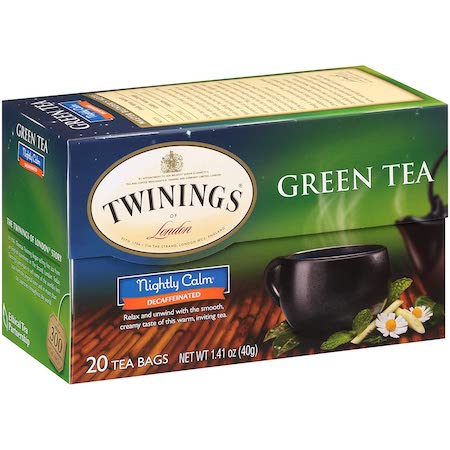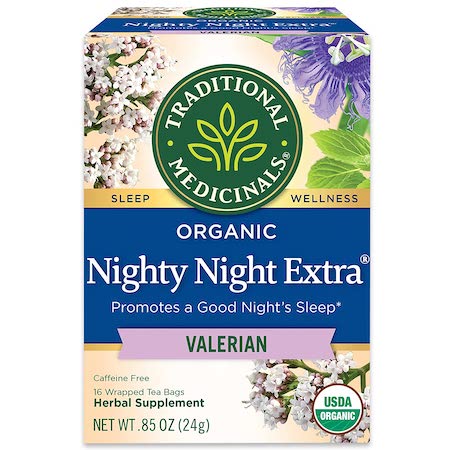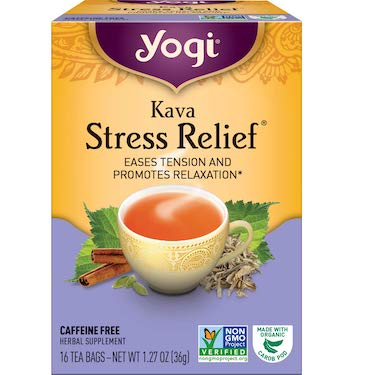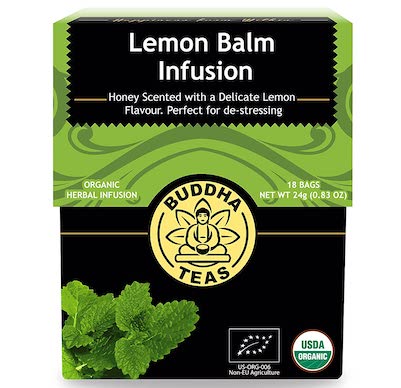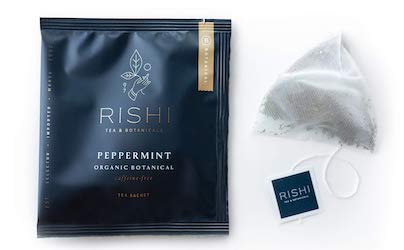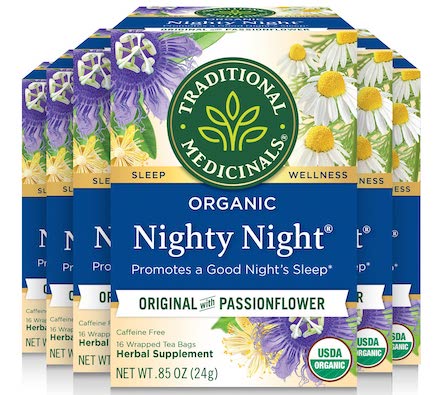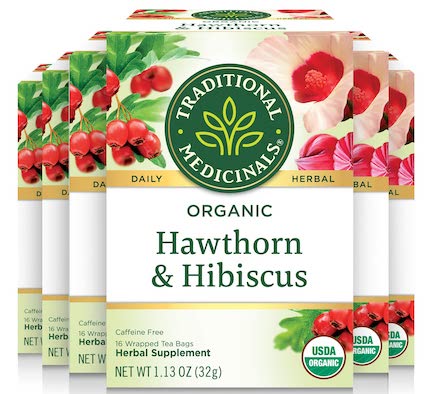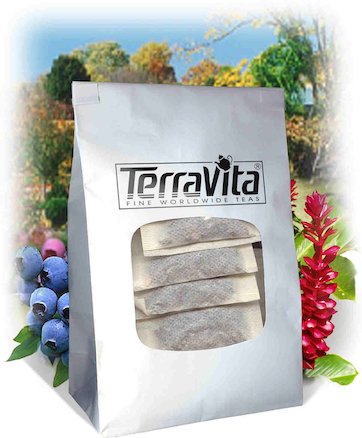If you’re in search of the best teas for sleep, you’ve come to the right place. Tea drinking is on a noticeable rise amongst Americans. And alternative types are becoming even more popular as research shows the various benefits inherent in tea.
One of the most talked about side-effects of tea drinking is the sleep advantages that particular teas have.
However, this is a surprisingly conflicted area of discussion. Does tea really help us sleep, or is it all just a warm, comforting placebo?
If you’re new to the world of natural sleep aids, you might not be aware of the hotly debated subject of sleep aid teas and their proposed benefits to insomnia sufferers.
To boil it down (pardon the pun), it all revolves around many claims that there are teas that help you sleep better by inducing restfulness and alleviating symptoms associated with restlessness at night, aka anxiety and stress.
However, at the heart of this promise is a dire lack of substantial scientific evidence to back it up. Even though many of the ingredients in these sleepy teas do have proven track records as sleep aids.
Often this is brushed to the side by pointing out that the lack of evidence is only due to a lack of scientific research in the first place.
As you can see, it’s heavy stuff. You might want to put the kettle on and settle in for the debate.
Does Sleep Tea Work?
For insomnia sufferers, or just regular people who struggle to drift off each night, the most important thing to is finding your way to that feeling of relaxation.
If you can relax and de-stress, then quality slumber is just a couple counts of sheep away.
And the combination of heat, steam and a lovely cup of something warm and soporific is a damn effective, all-natural method for inducing this feeling of homely relaxation. Thus, tea is the perfect candidate.
And why not? It’s lower in caffeine than coffee or other sweetened drinks (especially if you seek out decaf varieties), many of the different infusions help to settle everything from anxiety, depression to wakefulness – all massive causes of twisted sheets and baggy eyes.
We love the idea of a nightly sleepy tea because it’s easy to believe and it’s pleasant, and marketers know that.
But is there any truth to tea for sleep?
Sleep Tea as Placebo
Many believe that the supposed sleep inducing aspect of tea is simply a placebo – in fact, there is more scientific evidence to substantiate this claim than there are to back up the benefits, for example this study in the BioMed Central Journal, which showed no difference between a herbal tea drinking group and a placebo group.
Others argue that the herbal infusions aren’t real or “true” teas, seeing as an authentic tea does contain caffeine, whereas herbal infusions do not – as we know, the more caffeine the less sleep, generally.
The argument follows that drinking herbal tea doesn’t necessarily stop the feeling of wakefulness or insomnia, but that it simply doesn’t do anything to help those feelings – that it’s basically flowery water which creates the feeling of doing something.
The fact is, although there is lacking scientific research, and subsequent evidence, into the night-time advantages of tea drinking, there is also ample evidence that many of the ingredients do have benefits, and thus, until more research is done, we can safely assume that the teas do their sleepy job, too.
To Tea or Not to Tea
An important note on the scientific front is that most, if not all, studies into the positive effects of tea were based upon subjects’ own reporting of their symptoms. Which opens the results up to human error and personal bias.
That being said, when looking at the variety of herbal remedies that are available to us and have been in popular usage for treatment against anxiety, depression, blood pressure and mental hyperactivity (Valerian root, Chamomile tea, Passionflower tea), we can see effective results.
Why should these then be any different when the same ingredients are infused in warm water, or added to tea via drops or tinctures? Logic argues that they shouldn’t. And if anything, may even be improved upon by the natural relaxing elements of warm tea itself.
There are convincing arguments on both sides of the fence. But isn’t that the case for nearly everything under the sun? If one person finds that nightly Chamomile tea an hour before bed relaxes them and helps with a comfortable sleep, who are we, or anybody else to doubt that?
Why not try some for yourself, and see what works or doesn’t work for you? That’s the only real way you’ll get clear results until more scientific research is carried out. Plus, lots of lovely tea!
Ready to get your sip on? Get the low down on the best teas to help you sleep.
10 Best Teas for Sleep
But which teas are the best? Let’s find out.
Chamomile tea
Let’s start with the obvious – chamomile tea. Ask anyone for a sleepy tea recommendation and you know chamomile tea will come up. A lot.
So it’s little wonder that the majority of the top good night teas feature chamomile as the main ingredient. From Celestial Seasonings’ SleepyTime Tea to Bigelow’s Sweet Dreams Tea, you’ll find that chamomile is a major player.
And there’s good reason for it, too. The actual ingredient of chamomile has been linked with sleep aid since the dawn of the tea-drinking-caveman (cave gentleman?). This is mostly because the flower has proven anxiety and stress relieving properties, which are huge components of contemporary insomnia.
The reason chamomile tea has retained such popularity is due to its lack of other side-effects. For example, the heavy sedation that comes with some other natural remedies.
It’s relaxing, yummy and gentle – making it the perfect cup of sleeping tea.
Green tea
Naturally, you want to make sure that you’re drinking a decaffeinated form of green tea otherwise the beneficial effects can be nulled. But as long as you go decaf, green is a great tea to help you sleep. That’s ’cause these teas contain theanine – an amino acid that encourages drowsiness and fulfilling sleep.
As an added bonus, green tea also contains flavonoids which prompt your metabolism to tick over during the night, helping with weight and appetite regulation. So if you want to lose weight while you sleep – who doesn’t? – this is your best tea for sleep.
Valerian tea
The root of the valerian plant is used for a multitude of medicinal solutions. The most popular, by far, is its track record for helping insomnia sufferers get some much needed shut-eye. Again, devoid of troublesome side effects.
Added perk? The plant also has a reputation as being a powerful anxiety combatant. So if it’s worries and thoughts keeping you awake, this may be the best sleepy time tea for you.
Kava Kava tea
Kava is a controversial addition to the list. On one hand, it’s effective – seriously, it is a tea that makes you sleep. But on the other, its main ingredient (kava) is thought to be responsible for a whole list of complications with the FDA offering warnings about the ingredient.
That being said, it is, again, effective. No doubt thanks to its anxiety and insomnia combating effects. Plus, it remains unclear whether the problems associated with it can be empirically proven once and for all.
Lemon balm tea
Lemon balm often worms its way into sleep aid articles and recommendations. That’s due to the plethora of maladies it has helped with through the centuries.
Its most prominent use, today, is for relaxing and alleviating stress. Not to mention it also makes for a pretty yummy cup of tea itself (often combined with honey for an extra little spark!).
Peppermint tea
This one might not make it to the top of many lists of teas to help you sleep, mainly because it’s thought to be an energizing infusion which helps with digestive issues (which is all true). However many peoples’ insomnia is caused by just those symptoms – particularly after a heavy evening meal.
As such; if its cramps or digestive discomfort keeping you from nightly slumber, peppermint might be the one for you.
Oh, peppermint also helps lower testosterone levels and can even reduce excess hairiness in excessively hairy women. So if you’ve got that going on, you’re killing three birds with one tea. Not a bad deal.
Passionflower tea
If your insomnia is caused by a racing mind, or frequent interruptions during your nightly sleep (followed by a struggle to get back to sleep), then passionflower tea just might be your cup of sleepy tea.
This particular infusion boosts GABA production in the brain. That helps to lower activity a little, and ‘quieten’ things down mentally, allowing for a more relaxed drifting off.
Hibiscus tea
An unusual entry, hibiscus tea is another sleep aid tea which takes out symptoms of insomnia at the root and indirectly helps with sleep. This tea has been proven to have positive effects over high blood pressure and bodily tension – two symptoms which can keep even the deepest sleeper awake at night.
It also has the added benefit of potentially helping fend off diabetes (although this shouldn’t be taken as gospel until more research is carried out).
Hawthorne infused tea
This plant is chock full of good stuff. Not least its calming effects in general, but also its relaxing power over the cardiovascular system which can lower blood pressure and subsequently take some of the bite out of nightly stress.
This is another tea for sleeping that’s also abundant in flavonoids, just like the green tea, which we already know comes with its own battery of positive effects on the body. Another perk? Hawthorne tea is safe to drink regularly throughout the day, with no real warnings to go with it.
Magnolia Bark tea
Magnolia bark is a longstanding herbal remedy for anxiety and stress complaints in Asian countries, which is also thought to contain some sleep-inducing properties to boot.
The bark can come in tea bag variety, which is easiest. It’s also available in tinctures which can be added to other teas for an added nocturnal kick.
